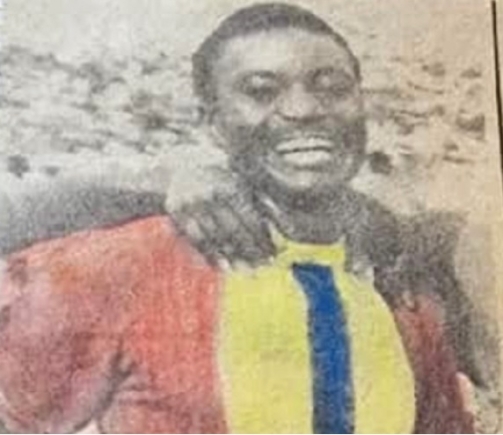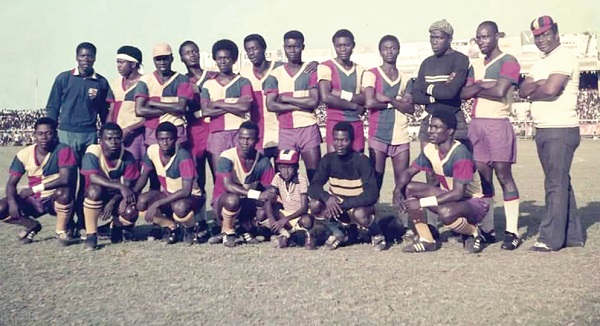
Thunder’ Anas Seidu made Ghana proud indeed
“The Directors, executive members, players and teeming supporters of the club have abiding faith in the Supreme Military Council, and as the Premier Club, we would be the last to show any disrespect towards members of the SMC, for the Head of State’s wisdom in pardoning ANAS SEIDU was evident last Sunday when ANAS was the two-goal hero in that crucial match against Zambia’s Mufulira Wanderers. We have succeeded in clearing all hurdles to reach the finals of the competition ………”
Tommy Thompson, Daily Graphic, Nov 11, 1977.
The above were excerpts from the 66th Anniversary message by the then Chairman of Hearts of Oak, the great Tommy Thompson. That one player, Anas Seidu Meyarki, was singled out on such an auspicious occasion, the club’s birthday, to celebrate his legendary status and it was “thunderous” . After all, for both club and country, he played his role with distinction, and indeed six days before the anniversary, he had set the nation agog with a superlative performance.
Gradual transition
The gradual transition due to a number of reasons such as age, nagging injuries or pursuit of further studies and other interests in the USA led to the departure of some great ones such as Robert Foley, Prince Amartey, Christian Madus, George Alhassan and Amusa (Pele) Gbadamoshi. Finding worthy replacements to wear these huge shoes wasn’t too much of a problem since the very functional conveyor belt had already identified some budding talents.
On the theory of “times and seasons”, a greater number of Hearts of Oak players, once upon a time, were split between ACCRA WEST or Korle Gonno/Mamprobi (ie. Paul Annan, Ofei Ansah, Adolf Armah, Douglas Tagoe etc.), ACCRA CENTRAL (ie. Peter Lamptey, Robert Hammond, Mills Aryee, Addo Quarcoo, George Tackie Abia (Nii Adama Latse I), Baba Gambo, Eben Nii Noi Thompson etc.) and, then ACCRA NORTH – Kotobabi/Lagos Town/Nima enclave (ie. The Ayuba bros, Tanko & Fuseini, Fargo Collins, Anas Seidu, Ibrahim Labaran, Joe Wassa, Mohammed Polo, Shaibu Fuseini and Mama Acquah).
Having competed against each other previously in those days of competitive colts football, that tendency of a benign rivalry among them was, perhaps, the reason for these solidarity blocs. Of course, a few other players were also scattered around Osu, La, Tema and Adabraka etc, and they chose which of these three blocs to align with as part of the healthy competition within.

Anas Seidu (standing 5th from right) with his Hearts of Oak teammates in the 70s
Fearsome Fivesome
Out of these great players emerged the famous “Fearsome Fivesome” of Mohammed Polo, Mama Acquah, Robert Hammond, Peter Lamptey and Anas Seidu, the trenchant quintet put up by the H.P. Nyemitei/Tommy Thompson/Addo Odametey “system” to terrorise defenders in Africa, as well as Ghana. To one extent when they made “KUMASI STOOD STILL” with a nine-man team in October 1976, three dependable Kotoko players (Dan Oppong, James Kuuku Dadzie and Joe Sam), all Black Stars players, were suspended for unproven allegations of bribery. Equally illuminating was the fact that four out of this quintet, at various stages, rose to become substantive captains of the club, including of course all the three Nima/Kotobabi/Lagos Town warriors.
This was the “SILVER GENERATION” of the Continental Club Masters that twice, in 1977 and 1979, with Anas as a pivot, were Vice Champions of Africa (credit Tommy Thompson). In those halcyon days, people risked their lives and travelled from afar to follow the team, every venue was filled to capacity. In Accra and Kumasi fans precariously hanged on the pylons of the floodlights to watch Anas and his mates. Churches closed early to avoid desertion. In the case of midweek, productivity was hugely affected as civil/public servants ran away from offices, shops closed early and students (yours truly inclusive) ran away from school to deploy whatever strategy that gave them access to the stadium. Till today, football historians have not been able to firmly conclude whether most of the players of Ato Ahwoi/Harry Zakkour/Thomas Okine/Jones Attuquayefio 64th Battalion of the “GOLDEN GENERATION” would have earned shirts in the 1975-79 squad.
Although a matter of opinion, this corollary is enough to make Anas a proud legend of Hearts/Ghana football.
Straight from colts and Inter-School football in the early 1970s, the very handsome, athletic and ambidextrous midfielder advertised this greatness with some brilliant performances. His
hunger for goals, even as a schemer, tactical discipline and trademark thunderous or bullet shots made him a household name.
Thunder
The sporting media wasted no time at the beginning of his great career to find a sobriquet for him, “THUNDER”. A rather jovial character off the field, his mates called him KOKOLOO for the precision and calmness with which he converted his penalty kicks and KAMAKAMAA for the bullet shots. He chose to call himself TUNDA. He did not only monopolise Amusa’s No. 10 shirt, he was the team’s expert and first choice for freekicks/spot-kicks. No wonder he was in tears when he broke the nation’s heart with his penalty miss in the first leg finals against Hafia in Accra on December 4, 1977.
One great attribute that made him the toast of Hearts fans was his absolute loyalty, and the fact that he had a sworn and unrepentant dislike for Kotoko, no matter the venue. Scoring against Kotoko was his hobby and, on different occasions, he just was a nightmare for either goalkeeper Mohammed Ayoma or Abdul Razak (as he just played him out). Unfortunately, he once carried it a bit too far that led to an assault on a referee during a match between these rivals, leading to a one-year ban by the Ghana Amateur Football Association (GAFA) in 1977.
Following series of apologies and interventions, including a petition to the Head of State, Gen. I.K. Acheampong, who was also in-charge of sports, he was pardoned.
In between, because the ban was not worldwide, he relocated to Kano (Nigeria) and started playing for Racca Rovers. A delegation was dispatched to bring him back, and what surprised the welcome party led by Alhaji Tijani Nagaya at the Kotoka International Airport was that, he’d convinced gritty defender, Yusif Salifu, to also come along. Both of them made indelible impact in the 1977 Africa campaign, especially in those frenetic quarter and semi-final battles against El-Ahly, Mufulira Wanderers, when his last goal within minutes of closure qualified Hearts to the finals.
Miracle of Kumasi
Scoring a hat-trick on either side was akin to finding a needle in a haystack. Four days to Hearts’ 68th birthday (1979, Kumasi, Champion of Champions); in one of football's most dramatic and rare comebacks, Anas showed the way in a 4-3 victory, after Kotoko's early two-goal lead. "The velocity of his first goal was so great that it pierced the net……as Hearts performed the second Miracle of Kumasi" (credit Ebo Quansah, Ghanaian Times 8/11/79).
At the national level, his meteoric rise through the Black Meteors in 1973 to the Black Stars climaxed five years later at 25, as a gold medalist at the 1978 Africa Cup of Nations which Ghana won for keeps. One of the very few flash points was the great pass he glided to his “rival”, Abdul Razak, to score that “golden goal” against Tunisia which sent Ghana to the final against the Cranes of Uganda.
Later on in life after a trip to Abu Dhabi for greener pastures, he returned to Hearts in 1984 and contributed greatly towards the club’s recapture of the league title which it last won in 1979, making it his personal fifth league championship. He might not have made it to the top when he tried his hands at the managerial role within the club, but the pride and joy he brought to the hearts of Hearts of Oak fans, the nation, as well as the benchmark he and his entire squad set shall always remain a legacy, and truly deserving of the honour accorded his generation during the club’s Centenary Celebration in 2011.
“THUNDER ANAS SEIDU, HE MADE GHANA PROUD (Daily Graphic 5/11/97).
You made Ghana proud indeed. Rest in Peace.
NOTE: Anas Seidu passed away on July 1, 2023, and was buried the following day in line with the muslim custom.
